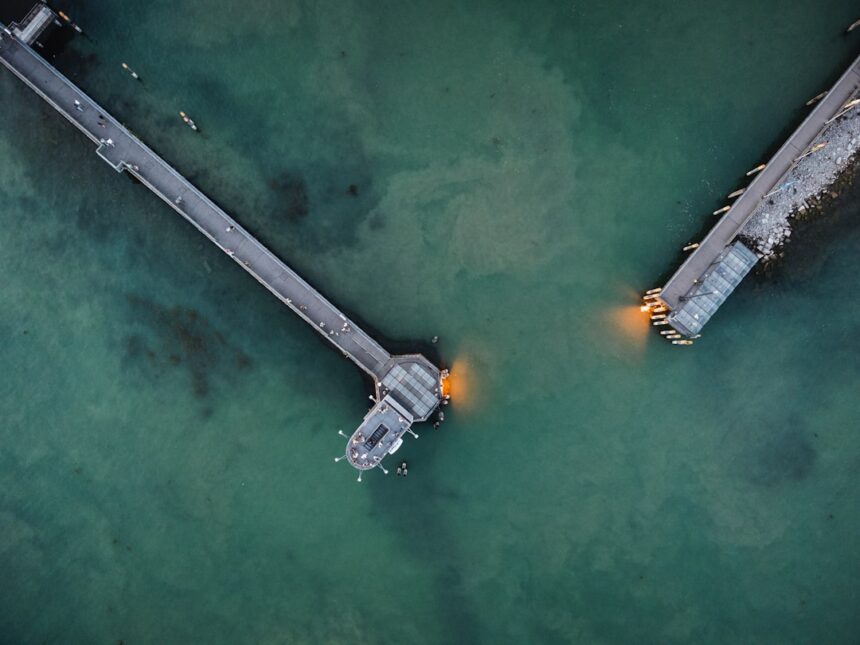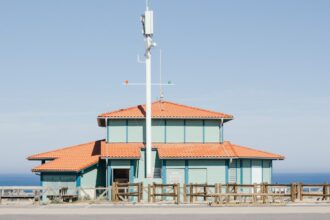The Nord Stream 2 pipeline, a significant infrastructure project designed to transport natural gas from Russia to Germany, has been at the center of geopolitical tensions for years. In late September 2022, a series of explosions rocked the Baltic Sea, leading to substantial damage to the pipeline. This incident not only raised alarms about the security of energy supplies in Europe but also highlighted the fragility of international relations in an increasingly polarized world.
The attack on Nord Stream 2 was not merely an act of sabotage; it was a stark reminder of the vulnerabilities inherent in critical infrastructure and the lengths to which state and non-state actors might go to achieve their objectives. The ramifications of this attack extend far beyond the immediate physical damage to the pipeline. It has sparked a wave of speculation regarding the motivations behind such a brazen act and who might be responsible.
As nations grapple with the implications of this incident, it becomes clear that the attack on Nord Stream 2 is emblematic of broader geopolitical struggles, particularly in the context of energy security and dependence on fossil fuels. The incident has ignited debates about energy policy, national security, and the future of international cooperation in an era marked by rising tensions.
Key Takeaways
- The Nord Stream 2 pipeline, a controversial gas pipeline project, was recently targeted in an attack.
- The attack has caused significant delays and financial losses for the Nord Stream 2 project, impacting energy supply and geopolitical dynamics.
- Suspected perpetrators of the attack include state actors, cybercriminals, and environmental activists, with no clear evidence pointing to a specific group.
- Possible motives for the attack range from geopolitical interests and economic sabotage to environmental concerns and opposition to Russian influence.
- International investigative efforts are underway to uncover the culprit, with various countries and organizations involved in the process.
The Impact of the Attack on Nord Stream 2
The immediate impact of the attack on Nord Stream 2 was catastrophic. The explosions resulted in significant leaks of natural gas into the Baltic Sea, leading to environmental concerns and raising questions about the safety of underwater infrastructure. The damage rendered the pipeline inoperable, effectively halting its operations and leaving many European countries that relied on Russian gas scrambling for alternatives.
This disruption not only affected energy supplies but also sent shockwaves through global markets, causing fluctuations in gas prices and prompting urgent discussions about energy independence. In addition to the physical damage, the attack has had profound political implications. It has intensified existing divisions within Europe regarding energy policy and reliance on Russian gas.
Countries that have long advocated for a reduction in dependence on Russian energy sources found their arguments bolstered by this incident, while others faced pressure to reassess their energy strategies. The attack has also led to increased military presence in the region, as nations seek to protect their critical infrastructure from potential future threats. The overall atmosphere of uncertainty surrounding energy security has prompted a reevaluation of energy strategies across Europe.
Suspected Perpetrators of the Attack

In the wake of the Nord Stream 2 attack, various parties have been implicated as potential perpetrators. Speculation has run rampant, with accusations directed at state actors and non-state groups alike. Some analysts have pointed fingers at Russia, suggesting that the Kremlin may have orchestrated the attack as a means of exerting pressure on Europe amid ongoing tensions over Ukraine and other geopolitical issues.
Others have suggested that Western nations could be involved, either as a means of undermining Russian influence or as a way to galvanize support for alternative energy sources. The lack of concrete evidence has made it challenging to pinpoint those responsible definitively. Investigations have been launched by multiple countries, but the complexity of underwater sabotage and the geopolitical ramifications make it difficult to draw clear conclusions.
As nations sift through intelligence reports and analyze available data, the question of who is behind the attack remains shrouded in uncertainty. This ambiguity only serves to heighten tensions among nations, as each side grapples with its narrative and seeks to position itself favorably in the court of public opinion.
Possible Motives for the Attack
| Motive | Description |
|---|---|
| Political | Attack carried out for political reasons or to influence government policies. |
| Religious | Attack motivated by religious beliefs or to promote a particular religious agenda. |
| Revenge | Retaliation for perceived wrongs or grievances against a person, group, or organization. |
| Financial Gain | Attack conducted to obtain money, resources, or financial advantage. |
| Ideological | Driven by a specific ideology or belief system, such as extremism or radicalism. |
The motives behind the attack on Nord Stream 2 are as complex as they are varied. One prevailing theory suggests that it was an act of sabotage aimed at destabilizing European reliance on Russian energy supplies. By damaging this critical infrastructure, perpetrators may have sought to create a sense of urgency among European nations to diversify their energy sources and reduce dependence on Russia.
This motive aligns with broader geopolitical strategies that emphasize energy independence as a means of enhancing national security. Another possible motive could be linked to internal political dynamics within Europe and Russia. The attack may have been intended to provoke a response from European nations or to test their resolve in standing up against perceived aggression from Russia.
In this context, it could be seen as a strategic move designed to shift public opinion or influence policy decisions regarding energy imports and international relations. The multifaceted nature of these motives underscores the complexity of modern geopolitical conflicts, where actions are often driven by a combination of strategic interests, economic considerations, and political calculations.
Investigative Efforts to Uncover the Culprit
In response to the attack on Nord Stream 2, a flurry of investigative efforts has been initiated by various nations and international organizations. These investigations aim to uncover not only who was responsible for the sabotage but also how such an operation could have been executed without detection. Underwater sabotage presents unique challenges for investigators, as it requires specialized expertise and technology to analyze evidence from deep-sea environments.
Countries such as Germany, Denmark, and Sweden have taken the lead in these investigations, collaborating with intelligence agencies and maritime experts to piece together what happened. The process involves examining debris from the explosions, analyzing satellite imagery, and interviewing witnesses who may have seen unusual activity in the area prior to the attack. However, as investigations unfold, they are often hampered by political considerations and diplomatic sensitivities, making it difficult to reach definitive conclusions quickly.
International Response to the Attack

The international response to the Nord Stream 2 attack has been marked by a mix of condemnation, concern, and calls for increased security measures. Many nations expressed outrage at what they viewed as an assault on critical infrastructure that threatens not only energy supplies but also regional stability. The European Union quickly condemned the attack, emphasizing its commitment to protecting energy security and ensuring that such acts do not go unpunished.
In addition to diplomatic responses, some countries have begun reassessing their own energy policies in light of the attack. There is a growing recognition that reliance on any single source or supplier for energy can pose significant risks. As a result, discussions around diversifying energy sources and investing in renewable alternatives have gained momentum within international forums.
The attack has served as a catalyst for renewed dialogue about energy independence and collective security among nations.
Security Implications of the Attack
The security implications of the Nord Stream 2 attack extend far beyond its immediate impact on energy supplies. It has raised alarms about the vulnerability of critical infrastructure worldwide, prompting nations to reevaluate their security protocols for pipelines, power grids, and other essential systems. The incident serves as a stark reminder that modern warfare can take many forms, including cyberattacks and sabotage aimed at disrupting vital services.
In response to these concerns, many countries are investing in enhanced surveillance and protection measures for their critical infrastructure. This includes deploying advanced technologies such as drones and underwater sensors to monitor potential threats in real time. Additionally, there is an increasing emphasis on international cooperation in sharing intelligence related to infrastructure security, recognizing that threats often transcend national borders.
Economic Consequences of the Attack
The economic consequences of the Nord Stream 2 attack have been profound and far-reaching. In the immediate aftermath, gas prices surged across Europe as markets reacted to fears of supply shortages. Countries heavily reliant on Russian gas found themselves scrambling for alternative sources, leading to increased competition for liquefied natural gas (LNG) supplies from other regions.
This shift not only affected pricing but also highlighted vulnerabilities within European energy markets. Long-term economic implications are also at play as nations reassess their energy strategies in light of this incident. The attack has prompted discussions about investing in renewable energy sources and enhancing domestic production capabilities to reduce reliance on foreign suppliers.
Future of Nord Stream 2 Project
The future of the Nord Stream 2 project remains uncertain following the attack. With significant damage inflicted on the pipeline infrastructure, questions arise about whether it can be repaired or if it will be permanently decommissioned. The geopolitical landscape surrounding energy supply routes is also shifting rapidly, with many European nations reconsidering their reliance on Russian gas altogether.
As discussions about energy independence gain traction across Europe, there is a possibility that alternative projects may emerge in response to this incident. The focus may shift toward developing renewable energy sources or investing in new pipeline projects that prioritize security and diversification over reliance on any single supplier. The future trajectory of Nord Stream 2 will likely depend not only on technical assessments but also on broader political dynamics within Europe and its relationship with Russia.
Measures to Prevent Similar Attacks in the Future
In light of the Nord Stream 2 attack, there is an urgent need for measures aimed at preventing similar incidents in the future. Nations are increasingly recognizing that safeguarding critical infrastructure requires a multifaceted approach that encompasses both physical security measures and cyber defenses. Enhanced surveillance capabilities, including real-time monitoring systems for pipelines and underwater installations, are becoming essential components of national security strategies.
Moreover, international collaboration will play a crucial role in addressing these challenges effectively. Countries must work together to share intelligence regarding potential threats and develop joint protocols for responding to incidents involving critical infrastructure. By fostering cooperation among nations and investing in advanced technologies, it may be possible to mitigate risks associated with sabotage and ensure greater resilience against future attacks.
Conclusion and Call to Action
The attack on Nord Stream 2 serves as a wake-up call for nations around the world regarding the vulnerabilities inherent in critical infrastructure systems. As geopolitical tensions continue to rise and energy security becomes increasingly paramount, it is essential for governments to take proactive measures aimed at safeguarding their resources while fostering international cooperation. A collective response is necessary—one that prioritizes investment in secure energy systems while promoting diversification away from single-source dependencies.
By working together across borders and sharing best practices for infrastructure protection, nations can build resilience against future threats and ensure that critical resources remain secure for generations to come. The time for action is now; only through collaboration can countries hope to navigate an uncertain future marked by evolving challenges in energy security and geopolitical stability.
In the ongoing investigation into the Nord Stream 2 attack, questions about accountability and geopolitical implications continue to surface. A related article that delves into the complexities surrounding this issue can be found on the website “In The War Room.” This article provides an in-depth analysis of the potential actors involved and the broader international ramifications of the attack. For more detailed insights, you can read the full article by visiting




